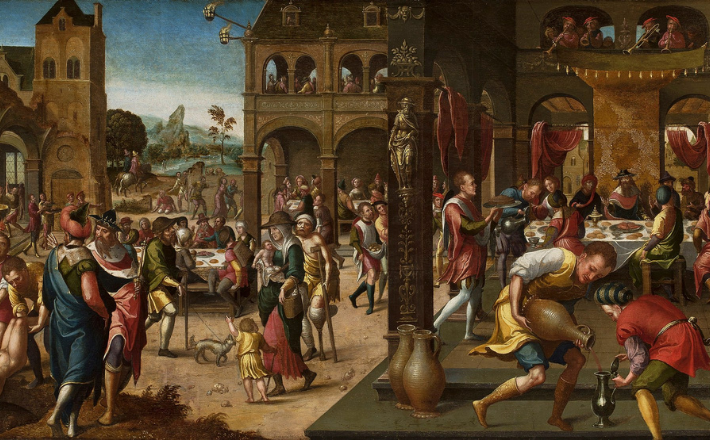Commentary on Luke 14:1, 7-14
Jesus likes to eat, fellowship, and party with others across a range of backgrounds. This is something we see throughout the Gospel of Luke (5:29–30; 10:38–42; 11:37). Thus, it should not be a surprise that in this week’s lectionary passage, Jesus is at a meal.
People watching
Specifically, in our text, Jesus is at “a meal on the Sabbath” at the house of a prominent Pharisee, a member of the religious elite (14:1). Preachers will want to avoid perpetuating an overly negative portrayal of all Pharisees. In the preceding chapter, for example, Jesus seems to have been warned by some Pharisees to leave a region in order to keep from being killed (see also 13:31). Moreover, as religious leaders devoted to the Torah, Jesus and the Pharisees shared more in common than is often realized. Still, theirs was a tense relationship. Among other things, Jesus regularly challenges their interpretation of the Sabbath (13:10–17; 14:2–6). Hence, while Jesus is at the meal, the religious leaders are “watching him closely” (14:1).
However, as they are watching Jesus, Jesus begins watching them—that is, he notices the actions of the “guests” at the meal (14:7). In other words, Jesus is people-watching. He’s checking out who is talking to whom, where people are sitting, who is present, and who is absent. As a result, Jesus offers two related teachings.
Seats of status
First, in verses 7–11, Jesus tells the guests at the meal to pay attention to the seats they seek. Jesus notices that people at the meal “chose the places of honor” (14:7). In other words, they are seeking seats of status. In Greco-Roman society, formal meals like this would often take place at a U-shaped table. Each guest would be assigned a seat at the table that demonstrated their rank or social standing—from highest to lowest. It would be deeply shameful to sit at the place of honor, only to be moved to the lowest place. Jesus tells a parable of “a wedding banquet” where this kind of behavior is taking place, to challenge the attention and affections of those at the meal (14:8).
Given the celebrity culture of our society, preachers may want to include an example of how we often try to position ourselves in places of status. I experienced this temptation recently as I was at a small gathering with a well-known pastor. When I walked into the room, I realized there was an open seat next to the pastor. Immediately, I was struck by how strong my desire was to sit next to the person. While I could list several reasons, I know that a significant part of why I wanted to sit next to the pastor is that I thought some of their status might rub off on me. I wanted the best seat. However, in this parable, Jesus speaks to the perils of pursuing places of honor.
Rather than seeking positions and places of status, Jesus suggests that the religious leaders choose the lowest places. Why? Luke records these challenging words from Jesus: “For all those who exalt themselves will be humbled, and those who humble themselves will be exalted” (14:11). It is vital to remember the audience in this text. Jesus does not call the marginalized, poor, and often-overlooked servants at the party to humble themselves. Rather, he is speaking to the guests gathered for a meal at “the house of a leader of the Pharisees” (14:1). Most of these folks are likely of rather high status.
Preachers should be attentive to the different ways in which folks might be called to live out humility, given our different positions in the world. Everyone is called to humility, but the path may look different. Moreover, it is important to note that Jesus’ words on humility should not be understood as simply good advice or a formula for advancing ourselves socially. This would be missing the profundity of Luke’s broader vision of the subversive order of God’s reign (1:46–56; 4:18–19; 6:20–26). Jesus isn’t offering tips for how to climb the social ladder. Instead, Jesus invites us to live in an entirely different world within this world—a world called the kingdom of God.
Expanding our guest list
In the second portion of the lectionary passage, verses 12–14, Jesus continues to subvert the norms of his time. Directing his words to the organizer of the party or “the one who had invited him,” Jesus says that when you plan a meal, you ought “not invite your friends or your brothers or your relatives or rich neighbors” (14:12). This may sound odd. However, it was common practice in Greco-Roman society to invite people to parties who could in some way benefit you socially. People expected others to reciprocate or pay back their good deed. It made sense to invite your friends, family, and, of course, rich neighbors to a party. However, Jesus says this is the wrong guest list. Or at the least, the guest list is too narrow.
Rather, Jesus says, “Invite the poor, the crippled, the lame, and the blind” (14:13). This is a list of individuals who would’ve been socially and religiously excluded in ancient society. Jesus says these are the kinds of folks we should intentionally embrace. Earlier, Jesus did this as he healed “a man who had dropsy” (14:2). For this reason, even though it is not part of the lectionary this week, preachers may find it helpful to allude to the healing. Moreover, preachers might consider inviting listeners into a time of reflection on who tends to make their “guest list.” Who do we tend to eat with? Who is invited to our gatherings? And how might the Spirit be prompting us as a community to expand our guest lists?
Of course, for Jesus, the goal of expanding our guest lists is not to be repaid by others, since we will ultimately be “repaid at the resurrection of the righteous” (14:14). Jesus’ reference seems to relate to the eschatological banquet or feast that is referenced in verses 15–24 in a parable—a theme that appears in the Scriptures again and again (Isaiah 25:6–8; 55:1–2; 65:13–14; Luke 5:34–35; Revelation 19:7–9). In short, we can trust the abundance of God. No one who lives in Jesus and his humble way will miss a seat at the table that matters most.


August 31, 2025